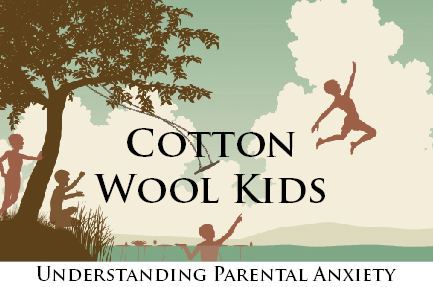Cotton Wool Kids – Understanding Parental Anxiety

‘The monsters of the mind are worse than those that actually exist. Fear, doubt, and hate have hamstrung more people than beasts ever have.’
Why are we feeling more anxious?
Wise words indeed from the author Christopher Paolini, because in recent years anxiety has bypassed all other mental health issues such as addiction and depression to become the most common mental health issue in Ireland today. This came as no surprise to me as in my work as a psychotherapist, I have become increasingly concerned about the numbers of anxious parents coming in to me with concerns about themselves or about their children’s anxiety. Oftentimes the parents tell me that that they have always been a bit anxious but have generally managed to keep it under control however their children seem to take the anxiety one step further. Anxiety can fall on any passing thought or it can be a more specific and focussed anxiety. In many ways it doesn’t really matter what the anxiety is about; it generally means that the child feels in some way insecure about their self, their world and their future. And they’re right; we don’t really know where we’ve come from and we don’t know where we’re going.
I give public talks on the subject of anxiety and mental well-being in Ireland and at nearly every talk someone from the audience raises their hand and asks why it is that anxiety is becoming so common? Why do so many parents find it difficult to raise two children in 2016 when our parents seemed to find it a good deal easier to raise four children in 1986 – and often with far less money?
Perhaps the most significant change that has occurred to parenting since our own childhood is not that childhood has become unsafe or more difficult, rather it is that commercial interests have figured out that they can make serious money by capitalising on parents’ fears and anxieties. Why can any 21st century parent instantly reel off the names of children from around the world who met ghastly ends? The mere names bring a shiver down parents’ spines – Madeleine McCann, Jamie Bolger, Jon Benet Ramsay … And yet, although the statistics concerning this subject were exactly the same when we were children, our parents probably couldn’t have reeled off the corresponding names from their generation! Our parents’ brains weren’t saturated with horrifying stories especially those with a peculiarly intense focus on gruesome stories about children. Our parents weren’t swimming in fear soup, and so they had significantly less anxiety when they were raising their children.
It’s all about the money
The roots of the rise in our anxiety levels can be traced back to the way society’s relentless pursuit of profit has accelerated over the last one hundred years. In 1929 Charles F. Kettering, Director of General Motors, wrote an article called ‘Keep the Consumer Dissatisfied’, which (horribly) became almost a code of conduct for salesmen the world over. According to Kettering, the ‘key to economic prosperity is the organised creation of dissatisfaction … If everyone were satisfied no one would buy the new thing.’ And this is why salesmen freak us out with the message that we’re never quite good enough, that we aren’t quite happy enough, or rich enough or safe enough.
Sharp-suited businessmen in shiny offices around the world are pushing consumerism at everyone, and the easiest way to convince people to spend more money is to convince them that their health or their security or even (ironically) their well-being is at risk. Big business pretends to help us by selling non-essentials by highlighting for us that our life isn’t quite right. But of course it isn’t! No one has life all worked out and the sooner we learn to live with uncertainty and insecurity the sooner we can learn to live with the slings and arrows that life throws at us.
It’s hard to feel confident and satisfied as a parent when you are continuously barraged with information that suggests that you’re not coping as well as you should be. Everywhere you look there are books, articles, programmes, websites, forums, blogs, educational toys, and endless accessories that are described as essential for parents. They aren’t essential, we all know this, but this feeling that we haven’t bought all the safety gadgets, that we aren’t providing the Disney experience - that our children are missing out on the latest opportunity - leaves us with the unsettling feeling that we have never quite finished our homework and that we’re a couple of steps behind. All this leads many parents to believe that we’re not quite good enough and that we really should be trying harder. And yet most parents are kind and loving and most parents are trying their best to provide their children with a nice lifestyle combined with plenty of opportunity – in reality, most parents are good enough. And good enough is good enough.
Going into a baby store today, customers are accosted by an enormous array of health and safety products. I recently wandered through our local baby store and gazed in bewilderment at the latest gadget that will apparently prevent my child from opening the toilet lid and tumbling down the passageway to certain death. Lucky parents can now buy stuff that supposedly protects our babies from table corners, electric sockets, steps, windows, taps, toilets, doors swinging shut, cupboards swinging open, containers, drawers and any number of relatively benign commonplace fixtures in our homes. There are also sun tents, sun shades, sun protectors, rain protectors, wind protectors, glass safety-film and elaborate stair gates that no man or beast can open.

Heightened Expectations
When parents move from the trenches of the early years to the front-line of middle childhood the focus of the anxiety is often re-directed by commercial interests from the child’s safety to the child’s future. External pressures are so heightened and doom-laden that no sooner does the child begin school that the parents begin to worry about his or her education and future prospects. The tabloid media, of course, adds to these fears: How well does your child’s school perform in the school league tables? How effective is your tutor? Which is the best university? Which is the best course? Educate, educate, educate! Improve, improve, improve! Even though, if truth be told, there is little use in cutting yourself and your family to ribbons in a bid for future success; the advantages gained by attending Kumon classes can be lost very quickly because of the stress surrounding actually getting to the class (and the subsequent strain of listening to the rampantly competitive parents bleating on about their gifted children).
Loving parents are nowadays encouraged by society to expect too much of themselves. And many of us react to these expectations by valiantly upping our game, turning ourselves inside out by trying to be the all-singing, all-dancing Mary Poppins and Dead Poets Society inspirational teacher all rolled into one. And, of course, we fail miserably and end up yelling at the kids because they don’t appreciate our intense efforts.
Our culture today encourages children to follow the strictly laid-down criteria for exam success and learn vast tracts of information to be repeated verbatim in exams. Over the last couple of decades the amount of students who memorise essays and even their entire exams has massively increased from previous times. And so, in a weird way, as the children are educating-up, they are simultaneously dumbing-down. By pushing our children towards intensive study as the only means to long-term success in life (which is measured by financial success), we are encouraging them to buy into a future that will involve long working hours, costly childcare and little opportunity for freedom or fun with their family or friends. By buying into this they will continue the horrible cycle of children working too hard so they will be able to pay for future classes and future childcare for their future children.
As parents, we mostly seek for our children to be happy more than anything else, and so it is important that we do not mindlessly yield to the over-the- top work ethic that is rampant in our highly pressurised society today. Working too much, trying too hard and always chasing the next achievement is not the royal road to happiness; instead parents can kick back and tune into a pleasurable family life with their kids.
Scary stories in the media
The media has, of course, cottoned on to the fact that when an exceptionally horrible event happens to a child they stand to make shed loads of money. And the media’s obsession with grotesque and horrific stories – especially those involving children – contributes to increasing anxiety levels among parents.
In 2007 when Madeleine McCann went missing, the newspapers were quick to realise that if they led with a photo of Madeleine on the front cover they would sell on average 40,000 to 50,000 extra copies that day. That sort of revenue is hard to resist and few newspapers did, yet neuroscience has shown us that the more we see of an image – even when it is a repeat of the same image – the more common we believe it to be. This makes no logical sense but the visual processing part of our brains isn’t influenced by logic. So watching CSI Special Victims Unit and other gruesome ‘there’s a crazed killer in our midst’ programmes is, quite simply, bad for your brain.
It is long accepted that sensationalist stories have significant impact on people’s psyches and consequently guidelines have been introduced to ensure the reporting of suicide is responsible and doesn’t lead to copycat attempts. Similarly more guidelines could be introduced to ensure that reports surrounding child tragedies don’t take advantage of parent’s love and concern. This would reduce the number of journalists seeking out the grotesque and the bitterly sad stories involving children and encourage mature reflection in the media.
We need to be more protective of our mental health!
Most of us are generally anxious enough – we really don’t need to be warned of every worst-case scenario that could happen. I could slip in the shower and die today but this doesn’t really bear thinking about. As Annie Dillard wrote in The Writing Life ‘How we spend our days is, of course, how we spend our lives’, and so if we spend our days worrying about unlikely freak accidents then, as night follows day, we will fret our lives away. We need to protect our feelings of well-being – worrying continuously about unlikely and tragic scenarios is incredibly bad for your mental health. A child in the developed world has a 1 in 14 million chance of being abducted by a stranger while this same child has a 1 in 4 chance of one day suffering with a mental health problems as an adult; we need to keep our eye on the right ball as our mental health is far more fragile and more at risk than most other threats to our lives.
So what are loving parents to do? We want to raise happy, healthy kids but if we heed the media we are lead to believe that it’s a jungle out there, with crazed axe-men on every corner. This negativity shapes our brains and so the general consensus among psychologists is that parents should limit their exposure to gruesome stories. Reading sensationalist tabloids is akin to eating junk food, a very pleasant if guilty feeling as you are digesting but afterwards you often feel a bit nauseous and queasy. If a terrible tragedy happens we should try to read only thoughtful, considered accounts of the story because if we allow ourselves to read the tabloid media our brains will be impacted, and this in turn will increase our anxiety levels.
Parents are also advised to reduce our exposure to consumerism – as much as possible – as marketing tends to make us feel dissatisfied and insecure. If parents treat their children to more time in nature and more free-time to do nothing but connect with their inner selves, both parents and children will feel more relaxed and less anxious. As anyone who has read Richard Louv’s highly acclaimed Last Child in the Woods will know, being in nature works as a natural Prozac for children.
Parents can take their foot off the pedal, relax a bit more and re-connect with their own joy – many children thrive by being with other children and playing without interference from well-intentioned adults, whilst other children simply thrive by being alone; either way the parents don’t need to haplessly follow their kids around as if the world is filled with crazed axe-men – it’s not, and believing it is will damage both your mental health and your child’s mental health.
A large-scale UNICEF study showed that children today require more freedom, more joy and more free time – they don’t need more structured activities, they don’t need more supervision and they certainly don’t need to be filled with worry and strain. The good news is that the easiest way to raise happy and healthy children is for parents to be happy and healthy.

Stella O’Malley is a psychotherapist, writer and public speaker with over ten years’ experience as a mental health professional. Mercier Press recently published her highly acclaimed book ‘Cotton Wool Kids’ which reached No.5 on the Irish bestseller charts. Stella is a regular contributor to the Irish Independent and she appears often on the RTÉ to speak about mental wellbeing in today’s world. Stella also gives many public talks and lectures on a range of topics around the country.
Latest Issue
Upcoming Events
-
17/04/2020 to 26/04/2020
-
18/04/2020
-
23/04/2020
-
15/05/2020 to 23/05/2020
-
16/05/2020 to 17/05/2020
Recent Articles
Article Archive
- November 2013 (2)
- December 2013 (1)
- January 2014 (2)
- February 2014 (2)
- March 2014 (2)
- April 2014 (4)
- May 2014 (2)
- June 2014 (1)
- July 2014 (4)
- August 2014 (1)

